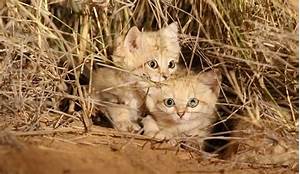Can Sand Cats Be Pets?
Sand cats have grown increasingly popular in recent years, capturing the attention of animal lovers with their adorable appearance and unique traits. If you're considering adding a sand cat to your family, it's crucial to understand their nature, lifestyle, and suitability as pets.

Habitat and Origin
1. Native to the deserts of North Africa, the Arabian Peninsula, and parts of Central Asia.
2. Adapted to extreme climates, they thrive in hot, arid environments with scarce water and vegetation.
3. Wild sand cats are solitary hunters, often traversing vast distances in search of food.
Physical Characteristics and Adaptations
1. Small to medium-sized cats with a distinctive reddish-brown coat and dark facial markings.
2. Large, wide-set ears aid in hearing prey movement and regulating body temperature.
3. Thick fur on their paws protects them from the scorching desert sand and extreme temperatures.
Behavior and Temperament
1. Unlike domesticated cats, sand cats are typically nocturnal, hunting primarily at night.
2. Known to be shy and elusive towards humans, they prefer to keep their distance.
3. Although they can be tamed, their wild instincts may make them unpredictable as pets.
Socialization and Interaction
1. Socialization with humans can be challenging due to their independent and solitary nature.
2. Early socialization from a young age might help establish some level of tameness.
3. Regular handling and interaction are essential for building a bond and establishing trust.
Diet and Nutrition
1. Predominantly carnivorous, with a diet consisting of small rodents, insects, and reptiles.
2. Provide high-quality cat food supplemented with live or freeze-dried prey to mimic their natural diet.
3. Ensure access to fresh water at all times.
Habitat Requirements
1. A spacious and enclosed enclosure that mimics their natural environment is ideal.
2. Provide a variety of hiding spots, climbing structures, and scratching posts.
3. Maintain appropriate temperature and humidity levels.
Health and Veterinary Care
1. Sand cats require specialized veterinary care, including vaccinations, parasite control, and regular checkups.
2. Prone to certain health issues, such as respiratory infections, eye problems, and obesity.
3. Regular monitoring and prompt medical attention are crucial for their well-being.
Legal and Ethical Considerations
1. Regulations and permits for keeping exotic pets vary by region, so check local laws before acquiring a sand cat.
2. Consider the ethical implications of keeping a wild animal in captivity, ensuring their welfare and respecting their natural instincts.
3. Support reputable breeders and organizations dedicated to the responsible care and conservation of sand cats.
Declaration: All article resources on this website, unless otherwise specified or labeled, are collected from online resources. If the content on this website infringes on the legitimate rights and interests of the original author, you can contact this website to delete it.




